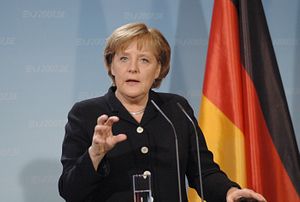Last Monday, German Chancellor Angela Merkel met with Japanese Prime Minister Shinzo Abe in Tokyo. The two sides emphasized their “shared values” and cooperation in dealing with global issues together – such as the crisis in Ukraine and counterterrorism measures against the Islamic State (IS). Abe opened the summit meeting by saying, “Taking this opportunity of Angela’s visit to Japan, I will further develop the bilateral relationship that is contributing to the world’s peace and prosperity.” Abe and Merkel discussed the “severe security environment confronted by the international community including the Asian region” – such as China’s expanding activities in the East China Sea, North Korea’s nuclear development, and the issue of Japanese abductees.
Both Japan and Germany are eager to use the 70th anniversary milestone to highlight their nonmilitary contributions to peace. During her visit, Merkel declared, “This year marks the 70th anniversary of the end of World War II, while 25 years have passed since the end of the Cold War.” “Germany and Japan have both achieved prominent development” since then, Merkel added, and “[t]hey are now in a position to exercise global responsibility within the world order.”
Merkel also praised Abe’s move to reform security legislation in line with implementing the goal of collective self-defense. When it comes to security reform, in some ways, Germany and Japan are following similar paths as both countries begin contributing more actively to world peace. Just as Japan lifted its arms export ban last April, last autumn, Germany provided weapons to Kurdish forces from northern Iraq battling IS. This is the first time that Germany has provided weapons to troops in conflict zones since WWII. Merkel’s support may help provide Abe with cover from his domestic political opponents.
As this year is the 70th anniversary of the end of World War II, history loomed particularly large at this meeting between German and Japanese leaders. At the summit meeting on Monday, Merkel said, “I am not in a position to give advice” about the history issue. At the press conference after the meeting, though, Merkel said, “How should we respond to the sin of the Holocaust for which we should take responsibility? Summing up the past can be a prerequisite to reconciliation.”
An interesting difference has emerged in how Japanese newspapers of opposing ideological leanings have chosen to frame these rather sparse comments.
The more conservative Yomiuri pointed out that Merkel avoided making any direct references to Japan’s perceptions of history and how that affects East Asian diplomacy. Yomiuri also noted that because China, not Japan, is Germany’s largest Asian trading partner, Merkel “was consistently careful not to become overly committed to one side between Japan and China” and “carefully kept her distance from issues of historical perceptions before and during World War II.” Yomiuri also made a point to report that Merkel has visited China for summit meetings five times in the past seven years, while this is the first time she has visited Japan since 2008.
These descriptions that imply Merkel’s hesitance in dealing with the issue are in marked contrast to the liberal Asahi, which ran the much more strident headlines “Merkel says reflecting on past a precondition for reconciliation” and “Merkel calls on Japan to reduce tensions with Asian neighbors.” The newspaper also added embellishments in its descriptions such as, “[Merkel] indicated that efforts at reconciliation were indispensable for regional stability” and “[She] urged Japan to work toward reducing tensions with its Asian neighbors.”
Merkel’s lecture was co-sponsored by Asahi, which caused some concern in the Abe government due to their combative relationship with the left-leaning newspaper. However, while Merkel’s comment in the lecture that Germany achieved reconciliation with Europe because it “squarely faced the past” was expected, she added that “[t]here was also tolerance on the part of our neighbor (France).” The latter comment was an unexpected surprise for Japanese, South Korean, and Chinese observers and a plus for the Abe government.
French Foreign Minister Laurent Fabius echoed Merkel’s sentiments when he responded in writing to questions from Asahi: “It is critically important to improve the triangular relations on the 70th anniversary of the wars’ end. A regional confrontation, including that over historical issues, must be addressed by the spirit of tolerance and dialogue.”
However, it is apt to ask whether the Germany-France relationship is the best comparison for Japan’s relationships with South Korea and China. Recent analysis by European scholars points instead to France-Algeria or Germany-Poland relations as the better comparison to Japan-South Korea relations, and Germany-Russia relations as a better analogy for Japan-China relations. In any case, Merkel is on point when she says that Germany is not in a position to offer advice to Japan – the geopolitical dynamics of Western Europe during the Cold War and East Asia in the post-Cold War era are simply too different to make any comparison meaningful.
































